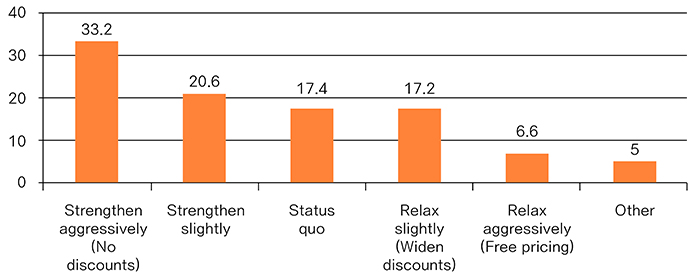|
South Korea's Fixed Book Price Policy
2019.08.05
Fixed book price policies are rules that set consumer prices for books at levels the publishers select. Countries where these policies exist, sell books at the same price anywhere you go. Instead of competition through prices at the commercial sale level, price competition takes place at the production stage between publishers, boosting the diversity of distribution channels and convenience of readers.
South Korea has a fixed book price policy in place, but from the consumer's point of view,
Currently, according to the publishing culture industry promotion law, South Korea has enforced fixed prices on both paper books and e-books. There is no limitation to the category for which the fixed prices are to be used and no term limit. However, magazines are the exception to this rule. Retail bookstores can provide up to a combined 15 percent discounts on books and consumer benefits equal to that amount. Direct price discounts may only be given up to 10 percent of the listed price. So usually, large-scale online bookstores will provide the 10 percent price discount in addition to a 5 percent cashback in mileage points. They use all the legal space that is available for discounts. However, most small to medium-sized brick and mortar stores cannot afford to give discounts, and they sell books at listed prices. Although South Korea has a fixed book price system in place, from the consumer's point of view, there is a 15 percent price difference from the listed price, hence taking away from the policy's original aim of having one price for every book. This is in contrast with daily newspaper prices (for one copy or subscriptions), which are the same anywhere in the country.
There were many who opposed, including the general public
After the current law was enacted, all books were now subject to the same discount caps no matter when they were published. Books to be sold to public institutions and libraries also had to abide by the rule, when previously they were exempt to it. There were many who opposed, including the general public that insisted consumer prices would go up because of the law, but the South Korean parliament eventually agreed a fixed book price policy was needed. It made a compromise, allowing some discounts to be made for consumers. The last amendment was effective in the fact that it narrowed discount rates. The current law is to be reconsidered by the culture minister every three years, and it can be changed through amendments. Online bookstores have sustained their growth with discounts and convenience as weapons, brick and mortar stores have slowed in their decline while more unique, smaller bookstores are growing in number.
As the size of the e-book market grows bigger and newer services emerge, a more complicated solution to the problems that the fixed book price system faces in South Korea is required. For example, the unlimited subscription plan that Amazon provides for its Kindle readers allows readers to read tens of thousands of books a month at a minimum price of about 5,500 won. In a country where there is no fixed book price system in place, this kind of service causes few problems, but for a country that does have one, the situation changes. Several e-book providers have already adopted this business model, and there is no legal article to say they are breaking the fixed book price rule. An e-book can be sold at full price when it is bought separately, but under unlimited subscription plans the book is provided at nearly no cost, causing conflict under the current law.
Written by Won-Keun Baek (Books & Society Research Institute, President) Won-Keun Baek (Books & Society Research Institute, President) |
|||||
Pre Megazine
-

New Tarot Made With Korean Colors and Patterns!
VOL.69
2024.04 -

Please Look After Mom by Shin Kyung-sook
VOL.69
2024.04 -

Paper Play – A Great Way for Emotional Development, Concentration, and Creativity!
VOL.68
2024.03 -

Submit Us Your Reviews of Korean Books!
VOL.68
2024.03 -

A Miraculous Workout Routine for a Healthier Body!
VOL.67
2024.02 -

The Hottest Place in Korea, Right Here, Right Now!
VOL.66
2024.01 -

Kim Jiyoung, Born 1982 by Cho Nam-Joo
VOL.66
2024.01 -

Concerning My Daughter by Kim Hye-jin
VOL.65
2023.12 -

Bake Delicious Bread that’s Just Right for Your Taste
VOL.65
2023.12 -

Craft Your Own Special Miniature Furniture
VOL.64
2023.11 -

Take Beautiful Palace Tours With a Book
VOL.63
2023.10 -

A Guide to Beautiful Korean Handwriting
VOL.62
2023.09 -

An Offbeat Trip to Jeju Island
VOL.61
2023.08 -

Prepare for Disasters with a Single Book
VOL.60
2023.07 -

The Hen Who Dreamed She Could Fly by Hwang Sun-mi
VOL.60
2023.07 -

Feel the Street Vibes with Watercolor Painting
VOL.59
2023.06 -

Bone Soup by Kim Young-tak
VOL.59
2023.06 -

Eat Healthier and Tastier – Korean Vegan Food
VOL.58
2023.05 -

Almond by Won-pyung Sohn
VOL.58
2023.05 -

Learn About and Have Greater Fun Drinking Korean Alcohol!
VOL.57
2023.04 -

Knitting YouTuber Daeri Kim’s “Easy Modern Daily Knit”
VOL.56
2023.03 -

A New Section for Readers’ Reviews!
VOL.55
2023.02








